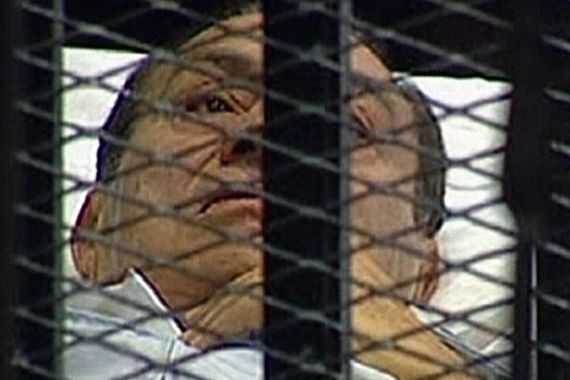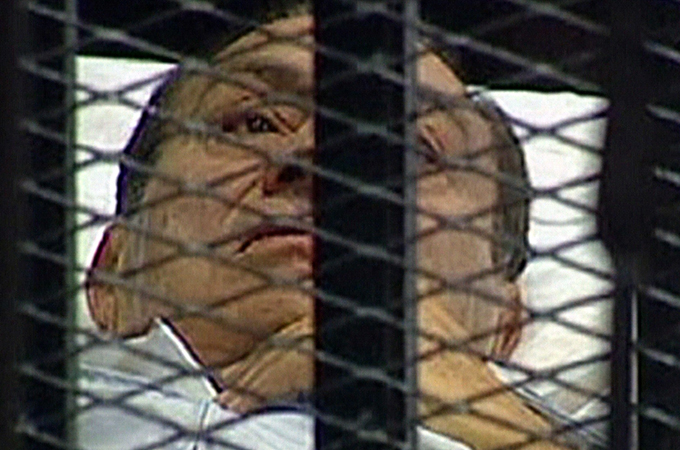Caging Mubarak: ‘The Pharaoh has no clothes’
The trial of the former president of Egypt shows how the “rule of the mighty” is being replaced by the rule of law.

 |
| Mubarak’s trial marks Egypt’s transition from the law of the king to the rule of law [AFP] |
An Arab president in a cage adds panache to the Arab Spring. The mighty Arab Spring has thus far catalysed the fall of the strong and the humbling of two arrogant power-makers.
Beyond catharsis and retribution, what does the “caging” of Mubarak and his trial imply for Egypt and the wider Arab Middle East?
The king is the law, no more
The image of the cage made of of mesh and bars, in which Mubarak appeared, humbled, will be haunting the powerful across the Arab world. Bashar al-Assad, Gaddafi, and many more must have taken notice. And so they should.
The significance of the trial is too huge to be limited to Egyptian geopolitical precincts. If this happens to the mighty Pharaoh today, in months and years to come it will reach the not so mighty. This is the tip of the iceberg.
August 3, 2011, is a date to be immortalised in the chronicles of the still-unfolding Arab revolution – and in the history of Arab and Middle East politics. From the courtroom in Cairo, the entire Arab political modus operandi and every delegitimised system is put on notice, as it were.
It is an indictment of Arab misrule, political arrogance, dynasticism, and, as in the Mubarak trial, corruption and the killing of protesters – the two charges for which the ousted president had to be caged in a Cairo courtroom.
Whether Mubarak dies, goes to jail, gets a suspended sentence or a pardon, from this moment in history, justice will have a fair go, restoring its status as law of the land. For some, Mubarak in the cage is a powerful symbol with implications that transcend the Egyptian context.
This is a day when “presidency” has fallen, forever losing its assumed shine, aura and rewards. The next president, whether in Egypt or Tunisia, will appreciate the restraints and the burdens that go with the territory of high office.
La Cage aux Folles
Indeed, something epic is happening in the Arab world. Never before did an Arab ruler under circumstances of peace stand before a court of law – even though all kind of allegations of actionable character for misuse of office, extra-juridical coercion and other acts of impropriety may be found against many Arab ruling elites, past and present.
The defendant in that cage was not the mortal called Mohamed Hosni Mubarak, till February 11, President-Pharaoh of Egypt. Rather, it was the follies of abuse of power and defiance of the faintest obligation of regard for the rule of law that lay on that stretcher.
One law-giver that never administered justice properly faced a different type of law-giver on August 3 in that Cairo courtroom. The latter was there not to try Mubarak, but may be more appropriately to declare to Egypt and the Arab world that “law is king”.
It was Mubarak and his posse that turned their back to the law after the 2005 elections when they decided to abuse due process and ban supervision of elections by judges. The November 2010 elections were noted not only for the absence of integrity, but also of legal monitors.
In keeping with the fundamental right that people deserve dignified treatment, even defendants answering grave charges such as Mubarak and his cohort, the accused must be assumed innocent until found guilty through an impartial robust and fair legal process. Failure to do so would be to replicate the cardinal sin of the previous regime: running amok of the law and lifting all legal protection for individuals, groups and social bodies.
The current legal process must contribute to correcting the wrongs of the past. Thus, not only legitimate defence of defendants must be protected at all cost, but they must also be treated with dignity. It is a right and duty that the cages used under three post-independence politico-juridical orders in Egypt must now, once and for all, be removed from the courts – where law is sovereign and the citizen, regardless of the charges, must remain dignified.
New Egypt or new Tunisia will need new legal doctrines with no room for the, albeit convenient and expedient, assumption of guilt to be given precedence over the assumption of innocence.
Arab Spring and progenitor of justice
An Arab Spring that does not herald a cultural shift from the rule by law – of kings and presidents – to the rule of law will sooner or later dissolve into nothingness. Only the rule of law, both in the procedure and substance of sovereign laws and inviolable rights, will ultimately act as arbiter between state and society, protector of the ruled, and guarantor of due process and good government.
As in the rest of the Arab world, Egypt’s postcolonial kangaroo justice system saw thousands tried for the simple reason that the state could stage political trials. To a point, eventually and inevitably, when people thought “Mubarak”, they thought “Pharaoh”.
Quranic symbolism and the Pharaoh
A dear Egyptian friend explains it all: The trial – for him and millions of others – affirmed faith in God, justice and the motherland. A miracle is on display, he says, referring to the many Quranic references to the Pharaoh.
The route to the presidency is largely through coups, bullets in some cases, but rarely ballots. Elsewhere, presidents are sworn to office knowing trial by the free media is an inevitability for the slightest faux-pas. This has been less so in Egypt, and never the case elsewhere by the gagged Arab media which is adept at self-censorship. Impeachment is never heard of. Nor is there a two-term tenure to fetter, bind and shackle the executors’ power.
So when Mubarak is wheeled on a stretcher into a meshed cage, my friend does not see a showpiece or a performative act, in the way of many cynics. Before him there is only invocation of Quranic words about the Pharaoh’s arrogance, corruption, control of the Kingdom of Egypt, and the dividing and slaughtering of subjects.
Thus, for him, the caged Mubarak is, symbolically, Godly punishment being meted out to the Pharaoh and his servants, partners in misrule and cronies.
The cage: the imagery, the imaginary
The image that springs to my mind, when Mubarak appears in that same cage, is that of Sayyid Qutb.
There is something haunting about the most famous picture of the iconic Sayyid Qutb in the cage, defying the injustice handed down in another Pharaoh’s court. The cages of the injustice system were “processed” – the innocent and the guilty, equally.
Most were, under Nasser as under his successors, assumed guilty and found guilty. Innocence was a rare legal commodity or idiom in the Arab world’s politicised “injustice” system.
Today, there is a twist of a different kind: the mighty Pharaoh enters the cage. Regardless of how justice is served or not served, from this point onwards, some justice has been served. It is crude to tell Egyptians or Tunisians not to get bogged down in the expensive, lengthy, messy “fair trial” – which may well leave much to be desired.
Nonetheless, the cage levels the playing field: presidents stand as equals before the law, just like ordinary Egyptians.
The imagery of Qutb and Mubarak, two powerful symbols of post-colonial Egypt, in the cage will never be looked at in the same light.
Sayyid Qutb, a man of letters above all else, regardless of the ideology he professed, should not have murdered by law for thinking differently from the state. Mubarak now will become a symbol that power status is no longer a bulwark against punishment.
Mubarak’s enters the cage as if to relieve the ghost of Sayyid Qutb’s haunting eyes, and blank expression as he fixed his full attention on the judges about to wrongly sentence him to death by hanging on the August 19, 1966.
Poetic justice
Maybe hell has no wrath like justice scorned. What is unfolding is justice’s fury. August 1966 and August 2011 now bridge two ideas of how politics is conducted – with justice and without.
Tora prison is now home to Gamal Mubarak and former minister Habib Al-Adli, whose interior ministry condemned thousands to illegal incarceration on behalf of the Pharaoh.
The Pharaoh has, as of August 3, entered the cage – the same cage through which three generations of dissidents, activists and free thinkers, men and women, spoke on behalf of the rights to equal citizenship and against corruption, exclusion and marginalisation.
The law is king
Mubarak – in the cage and on trial – will last in the memories of the free as some redress, and may be a milestone in Egypt’s journey towards the rule of law.
In a cage, or on that stretcher, it matters not whether the emperor has clothes. What matters more is Thomas Paine’s pearl of wisdom that, in good government, whether in America or Egypt, the law ought to be king. Egypt is on track: the chapter of the king as the law is being closed.
Dr Larbi Sadiki is a Senior Lecturer in Middle East Politics at the University of Exeter, and author of Arab Democratization: Elections without Democracy and The Search for Arab Democracy: Discourses and Counter-Discourses.
The views expressed in this article are the author’s own and do not necessarily reflect Al Jazeera’s editorial policy.
